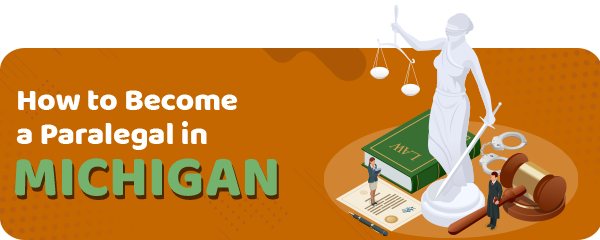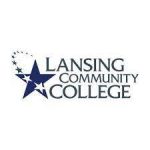A career in the legal industry can be a very challenging yet exciting career.
Candidates in the state of Michigan who would like to pursue a career as a paralegal have a few options available to them.
Michigan has no statewide requirements for paralegal certification.
However, in order to obtain a job in this field, candidates must meet the minimum entry-level requirements, which include obtaining an associate degree or certificate in paralegal studies.
In addition, obtaining some experience through internships may help to secure a job.
Article Table of Contents
Licensing Requirements to Become a Paralegal in Michigan
In the state of Michigan, paralegals are also labeled as paraprofessionals.
The state has no minimum educational requirements.
This allows candidates to obtain experience on the job.
However, to secure a job, most firms require that candidates have some form of qualification, such as an associate degree or a paralegal certificate.
Paralegals are permitted to work under the direct supervision of a licensed attorney and perform specific tasks.
Due to the fact that the state has no educational or licensure requirements, paralegals are not required to obtain state-level licensure in order to work in this field.
Furthermore, for those candidates who wish to pursue an education and obtain certification as a paralegal, they may do so through organizations such as the National Federation of Paralegal Associations (NFPA) and the National Association of Legal Assistants (NALA).
5 Paralegal Schools in Michigan
The following schools offer ABA-approved programs that help to prepare candidates, through training and internships, for a career as a paralegal in the state of Michigan.
1. Eastern Michigan University (Ypsilanti)
This school offers a Bachelor of Science (BS) in Paralegal Studies.
The program is ABA-approved and consists of 124 credits.
In addition, for those candidates who already have a degree in another field, and would like to transition into this field, the school offers a 72-credit bachelor’s degree program in Paralegal Studies.
The courses are available in either a hybrid format or completely online.
However, when students opt to attend the fully online format, at least nine credits need to be through synchronous formats.
The course is designed to teach students practical knowledge about the field and how it operates, such as law and court procedures, legal research and analysis, and drafting legal documents.
Students have the option to attend either an optional capstone or an optional paralegal internship supervised by a licensed attorney.
Courses include subjects such as:
- Law Office Administration and Technology
- Family Law
- Legal Writing
- Marijuana Law
- Civil Litigation
- Procedures
- Research and Analysis
- Investigation
- Women and Law
- Real Estate Law
Tuition for full-time undergraduate studies per year is $16,078.
2. Grand Valley State University (Allendale)
This university offers a 120-credit Bachelor of Arts (BA) in Legal Studies or a Bachelor of Science (BS) in Legal Studies, as well as a Paralegal Studies undergraduate certificate.
All of these courses are ABA approved and all classes are face-to-face.
The program is designed to promote critical thinking and problem solving while preparing students through a holistic approach to legal studies and encouraging a comprehensive understanding of the industry and its procedures.
While most of the course work between these programs is similar, the BA program does require three semesters of foreign language study and proficiency, while the Bs program requires the completion of coursework in statistics and research methods.
Tuition for this course is $16,860 per year for full-time study.
3. Henry Ford College (Dearborn)
Henry Ford College offers three programs in paralegal studies:
- Paralegal Studies Certificate of Achievement (22 credit hours)
- Paralegal Studies Associate in Business (39 credit hours)
- Legal Studies Certificate of Achievement (18 credit hours)
The program offers fundamental skills and knowledge required in this industry that help students attain success in their field.
Students are trained by qualified and licensed faculty that currently work in the field.
These programs are designed to help students prepare for law school should they wish to pursue such a career.
In-state tuition is approximately $4,428 while out-of-state students pay $6,420 per semester.
4. Lansing Community College (Lansing)
Lansing Community College offers two ABA-approved paralegal programs:
- Associate of Business (AB) in Legal Studies (63 credits)
- Post-Bachelor Certificate in Legal Studies (34 credits)
Both of these programs equip students with the skills and knowledge to perform a variety of tasks under the supervision of a licensed attorney, such as understanding the law, drafting legal documents, conducting research, and performing legal research.
Students are required to participate in a 160-hour internship where they will be exposed to real-life situations and gain valuable experience in the working world.
Tuition per year of full-time study is $4,353.
5. University of Detroit Mercy (Detroit)
The school offers a Certificate in Legal Studies program.
The certificate course was developed for the Pre-Law Program.
The course is comprised of a total of 24 credit hours and is a full-time, face-to-face course.
The program prepares students for a career in the legal field with a focus on skills for the legal profession, an understanding of the history and content of the law, the theoretical foundations of law, and the law of society. Students are required to participate in a capstone totaling three credits.
Tuition per year of full-time study is $18,338.
Paralegal Schools in Michigan – Summary Table
| School Name | Address |
|---|---|
| Eastern Michigan University | 900 Oakwood St, Ypsilanti, MI 48197 |
| Grand Valley State University | 1 Campus Dr, Allendale, MI 49401 |
| Henry Ford College | 5101 Evergreen Rd, Dearborn, MI 48128 |
| Lansing Community College | 409 N Washington Square, Lansing, MI 48933 |
| University of Detroit Mercy | 4001 W McNichols Rd, Detroit, MI 48221 |
Salary
There are three salary ranges as candidates progress in this industry and in this field, with varying levels of experience:
- Entry level – $46,899
- Mid-career – $60,196
- Experienced – $75,041
| Location | Avg. Annual Salary |
|---|---|
| Detroit | $61,176 |
| Grand Rapids | $58,331 |
| Warren | $61,176 |
| Flint | $56,066 |
| Sterling Heights | $60,984 |
| Lansing | $58,223 |
| Ann Arbor | $62,067 |
| Livonia | $60,984 |
| Dearborn | $61,176 |
| Westland | $61,381 |
Regional Salary in Michigan
| Region | Employed | Avg. Annual Salary | Avg. Hourly Pay | Top 10% Annual Salary | Bottom 10% Annual Salary |
|---|---|---|---|---|---|
| Ann Arbor, MI | 280 | $63,830 | $30.69 | $81,840 | $44,710 |
| Bay City, MI | 30 | $54,190 | $26.05 | $75,630 | $37,980 |
| Detroit-Warren-Dearborn, MI | 4,320 | $67,990 | $32.69 | $95,880 | $45,850 |
| Flint, MI | 180 | $57,890 | $27.83 | $77,720 | $45,620 |
| Grand Rapids-Wyoming-Kentwood, MI | 830 | $68,360 | $32.87 | $82,210 | $45,630 |
| Jackson, MI | 50 | $62,080 | $29.85 | $84,710 | $45,980 |
| Kalamazoo-Portage, MI | 220 | $56,920 | $27.36 | $75,170 | $39,630 |
| Lansing-East Lansing, MI | 350 | $60,820 | $29.24 | $81,440 | $45,460 |
| Midland, MI | 90 | $79,570 | $38.25 | $96,670 | $53,560 |
| Muskegon-Norton Shores, MI | 50 | $53,240 | $25.60 | $68,900 | $39,750 |
| Niles, MI | 50 | $57,850 | $27.81 | $77,720 | $44,320 |
| Saginaw, MI | 100 | $54,220 | $26.07 | $73,970 | $38,790 |
| Traverse City, MI | 90 | $57,350 | $27.57 | $76,830 | $46,600 |
* Employment conditions in your area may vary.
Frequently Asked Questions
Do you have to attend an ABA-approved course in Michigan?
There are no legal requirements that state you must attend an ABA-approved course.
However, prospective employers do give preference to candidates who have graduated from an ABA-approved program.
Do I have to sit for the National Federation of Paralegal Associations (NFPA) and the National Association of Legal Assistants (NALA) examinations?
No.
This is not required in Michigan.
Is an internship a requirement to gain employment in the field?
No, internships are voluntary with the exception of some programs that require students to attend an internship or capstone in order to graduate.
Read the full guide: How to Become a Paralegal





